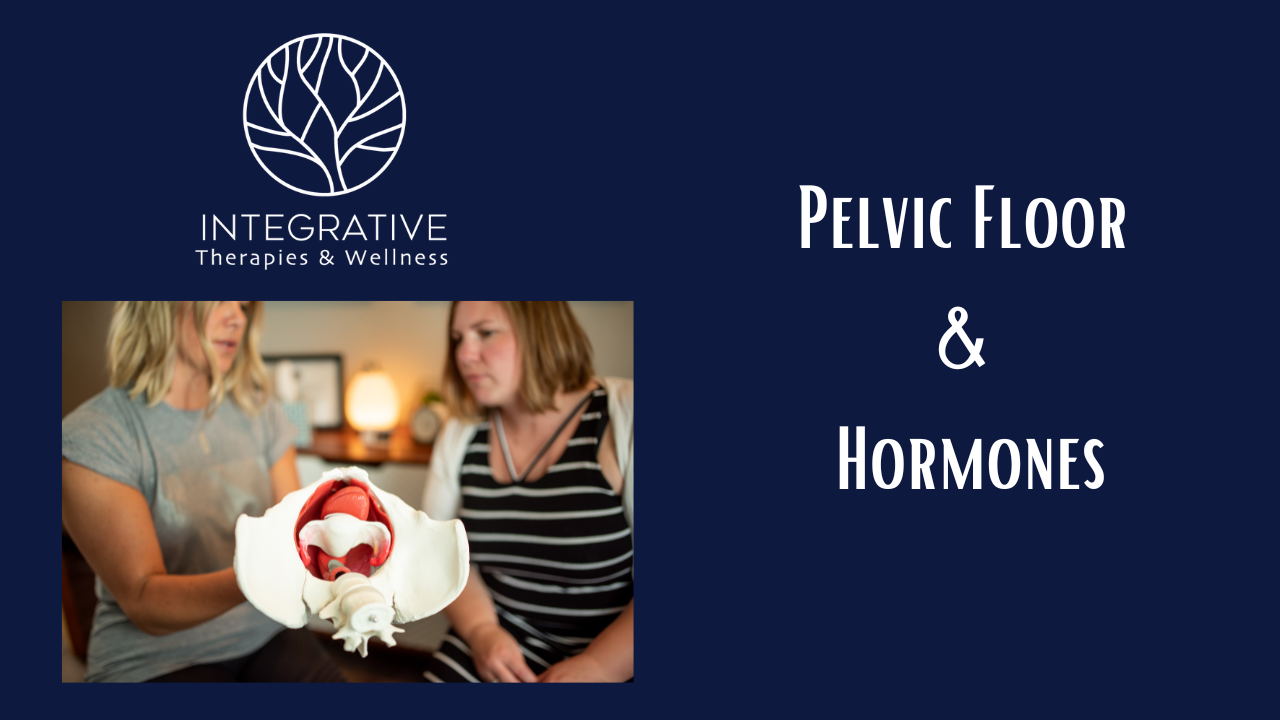Pelvic Floor and Hormones

The pelvic floor is an area of the body that cannot be ignored; its purpose is critical to overall health and living comfortably, yet it’s often misunderstood. Because of this, factors that are outside of the more common causes of pelvic floor issues, namely pregnancy, are overlooked, and one of these is hormone dysfunction.
With its main function being to cradle the bladder, bowels, and uterus or prostate, the pelvic floor is a complex blend of ligaments and muscles. When these are taxed or stretched, problems such as incontinence, inability to empty the bowels fully, leakage of urine or bowels, feeling the frequent urge to urinate, pain during intercourse, painful periods, ovulation pain, constipation, and other unpleasant issues may ensue. These are not only uncomfortable physically, but they also affect mental health as they can spark anxiety and depression due to the stress and fear around lack of control in bodily functions. However, understanding the role that hormones play in these situations is key, as it may play a major part in the healing process that can lead to a more comfortable life and improved health.
Women produce estrogen in varying amounts, depending on when ovulation occurs, which is when it is highest. When at the highest levels, ligament laxity can occur, which is a relaxing of the ligaments, therefore, causing the muscles in the pelvic floor to work in supporting the pelvic floor, as well as those surrounding it. If estrogen levels are lower than normal, for instance when a woman is breastfeeding or menopausal, then other issues, such as decreased vaginal lubrication, which can lead to pain or tearing during intercourse, may occur.
Adrenaline, Cortisol, Aldosterone, and Relaxin are other hormones that may affect pelvic floor health and function. Of these, the first three are produced by the body’s adrenal glands, atop the kidneys. Adrenaline links to our sympathetic nervous system (“fight or flight”), Cortisol is linked to the immune system and regulation of blood sugar, and Aldosterone regulates blood pressure and electrolytes. Relaxin, which is produced by the ovaries during the menstrual cycle and placenta during pregnancy, prepares the body for childbirth. It relaxes joints, muscles, and ligaments during birth; it basically produces ligament laxity, which is a good thing during labor and delivery, but not so good afterward in relation to pelvic floor health.
Stress affects our hormones and anxiety, lack of sleep, experiencing trauma, or having escalated emotions such as anger or frustration can cause overproduction with significant health repercussions. Ligament laxity can result, adrenal glands may be pushed to the limit and create dehydration or blood sugar concerns, or immunity can be compromised, all because of hormones spiking or dropping due to lifestyle and experiences.
Addressing symptoms early on is always a good idea, as it will hopefully identify root causes of discomfort and pain. Pelvic floor vitality and excellent health is possible when we can zone in on what is causing issues and then address imbalances. Working on the body’s muscles and fascia, boosting lifestyle habits such as water consumption and sleep, decreasing stress, and calming the muscles through various treatments and exercises build a solid foundation for the pelvic floor and, ultimately, lead to living a healthier, more carefree life.
Integrative Therapies and Wellness
Erin Lindberg
Stay connected with news and updates!
Join our mailing list to receive the latest news and updates from our team. Your information will not be shared.
-----THIS INFORMATION IS NOT A SUBSTITUTE FOR, NOR DOES IT REPLACE, PERSONALIZED MEDICAL ADVICE, DIAGNOSIS, OR TREATMENT. IF YOU HAVE ANY CONCERNS OR QUESTIONS ABOUT YOUR HEALTH, YOU SHOULD ALWAYS CONSULT WITH A HEALTH-CARE PROFESSIONAL. THE USE OF ANY INFORMATION PROVIDED IS SOLELY AT YOUR OWN RISK. -----

